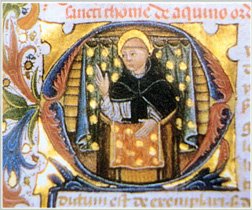Aquinas

St. Thomas Aquinas died on this date in 1274 at Fossanova around the age of 50.
The youngest son of an Italian count, Tomasso d'Aquino was sent to the Benedictine monastery at Monte Cassino at the age of 5, but when Emperor Frederick II was excommunicated, the monks went into hiding, and Thomas resumed his education in Naples. There Thomas encountered not only the works of the Christian fathers, but in the shadow of Frederick's intellectual tolerance, new exposure to Islamic and Greek writers such as Ibn Rushd and Aristotle. Excited by this intellectual climate, Aquinas decided on a life of study, preaching, teaching (and poverty), and attempted to join the Dominican brotherhood in 1244.
His family was apparently against the idea, imprisoning him in their castle for a time. His older brothers tried to break his resolve by sending a prostitute into his room; according to legend, Aquinas drove her away with a burning stick from his fireplace. After they relented, Aquinas studied under Albertus Magnus in Cologne, where he acquired the nickname "Dumb Ox" -- not so much for his intellect, but for his massive, slow physique. Albertus would say: "We call him the dumb ox, but the bellowing of that ox will resound throughout the whole world."
In 1251, he was ordained a priest and went to Paris where he received his masters in theology in 1256. Although he was modest and unassuming, Aquinas quickly became a master of the scholastic method of teaching, which entailed reading to a small group of students from a theological text (Peter Lombard's Sentences, 1148-51, a collection of opinions from church fathers, was the basic one), briefly explaining the point being made, and then analyzing the questions presented by it.
Within the swirling currents of the "new" Islamic and Greek philosophers posing questions about the existence of the world which did not seem to be adequately answered by the early church fathers, Aquinas increasingly found his scholastic analysis feeding on and reacting to Greek and Islamic sources, employing Ibn Rushd and Aristotle as counterpoints and methodological guides. He masterfully synthesized the disparate perspectives of the church fathers, and harmonized the "natural reason" expounded by the "new" philosophers with reasonable and rationally defensible Christian faith.
Where St. Augustine and his followers had proposed an unadorned faith through the notion that human reason had been hopelessly tarnished after the Fall of Adam and Eve, Aquinas, in his master work, Summa Theologica (c.1265-73), preferred to maintain that natural reason could be used to discover some extent of truth through the study of the evident effects of God's work in the world, and that grace completes the picture by filling in what cannot be learned from reason alone.
From this foundation, he created his "5 proofs" of the existence of God: (1) everything that is moved must be moved by something else, and since there is motion there must be a first mover; (2) from the sequence of efficient causes in sensible things, we can deduce a first efficient cause at the beginning of the sequence, which is God; (3) something in existence is necessary, and we may suppose that God is that which does not owe its existence to anything else, but is the cause of all necessity; (4) "more" and "less" are aspects of "greatness," which must be a reflection of some perfect "greatness" we call God; and (5) from the existence of "governance" and "guidance" as structures within the world, "there is therefore an intelligent being by whom all natural things are directed to their end. This we call God."
Writing Summa Theologica was an obsession for Aquinas: he ate and slept little during the years of its composition, and employed up to 4 secretaries at a time to take dictation on up to 4 topics at once; some even said he dictated in his sleep. Then, on December 6, 1273, he suddenly stopped dictating, apparently suffering a stroke during the Wednesday morning mass. With impaired speech, he answered a follower who asked why he had stopped working on the Summa Theologica, "I cannot [continue] because all that I have written seems like straw to me." Asked by Pope Gregory X to attend a council at Lyons, he died during the journey.
He is depicted in Dante's Divine Comedy as the vehicle by which the pilgrim may obtain knowledge as he yet climbs to heaven -- which is perhaps a fair distillation of what Aquinas was all about. He was canonized in 1323 and declared a "doctor of the church" in 1567 -- no mean feat for a man who, by nuance and rigorous logical discipline, managed to use the words of heathens to infuse the chaos of early Roman Catholic theology with a structure which would endure for centuries.
Labels: Christian History, Italy, Philosophy





0 Comments:
Post a Comment
Subscribe to Post Comments [Atom]
<< Home